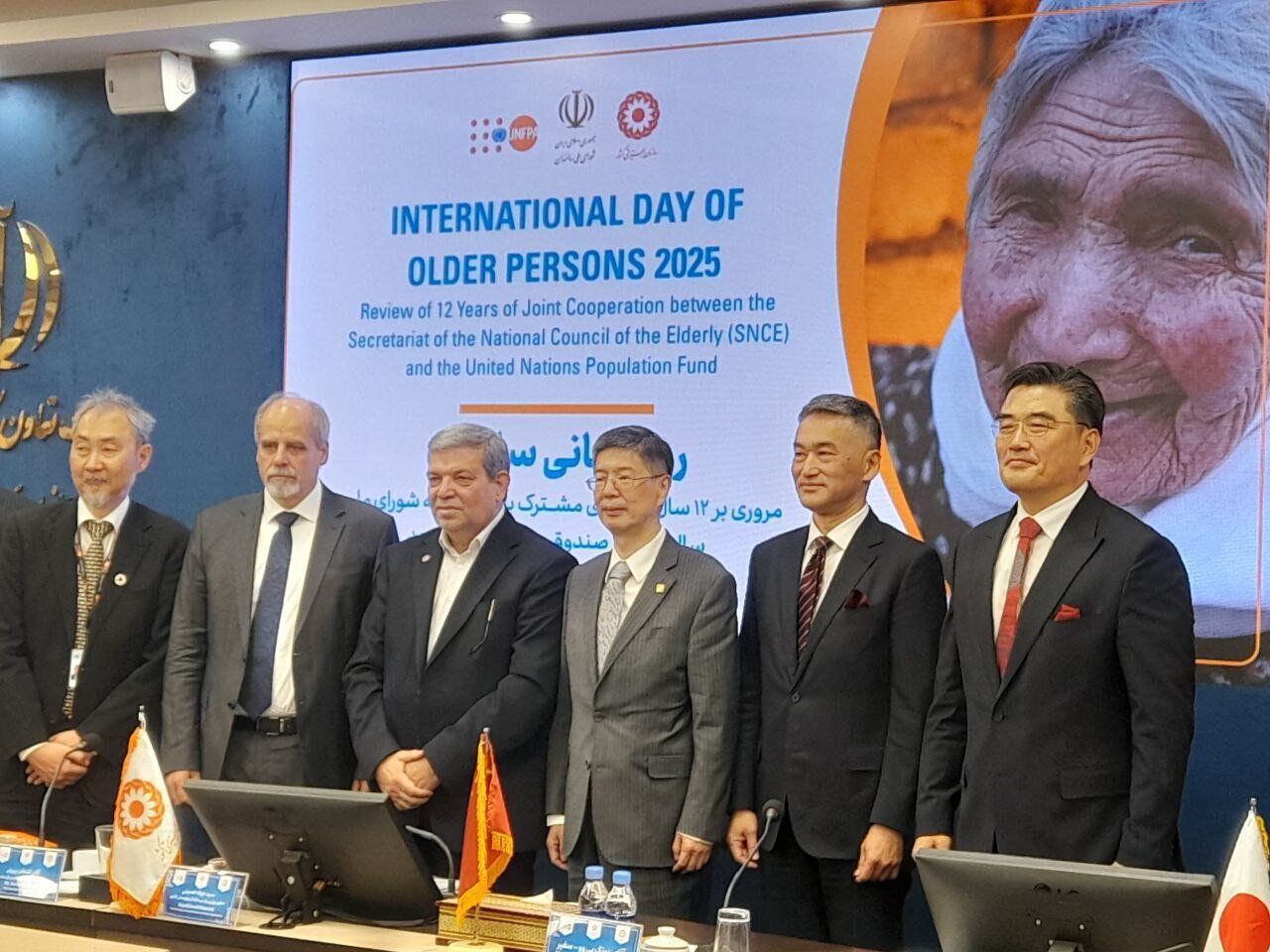Iran marks Intl. Day of Older Persons 2025

TEHRAN – The International Day of Older Persons was observed on Wednesday, October 1, in Tehran in the presence of Chinese, Japanese, and South Korean ambassadors, and the representatives of the United Nations to the country.
The 2025 United Nations International Day of Older Persons, observed under the theme “Older Persons Driving Local and Global Action: Our Aspirations, Our Well-Being and Our Rights”, highlights the transformative role older persons play in building resilient and equitable societies. Far from being passive beneficiaries, older persons are drivers of progress, contributing their knowledge and experience in areas such as health equity, financial well-being, community resilience, and human rights advocacy.
Addressing the event, Kita Ohashi, representative of the United Nations Population Fund (UNPFA), said, “We pay attention to the problems of aging in societies and work to combat ageism, empower the elderly, and create empowering environments.”
Given the feminization of aging, gender challenges have to be considered. Health inequalities and discriminatory practices will hinder the social participation of the elderly. Therefore, elderly women must be able to fully enjoy social benefits, he noted, IRNA reported.
The social engagement of the elderly needs to be increased by developing elderly friendly environments, he added.
Lauding Iran’s efforts in leading and pursuing services, as well as developing a roadmap for aging, the official highlighted addressing elderly women’s problems.
The United Nations Resident Coordinator for Iran, Stefan Priesner, for his part, said People worldwide can live up to 60 years; Iran is a rapidly aging country due to increased life expectancy. Life expectancy in Iran is over 70 years.
It is estimated that 30 percent of the world’s population will be elderly by 2050. With no strategy, these rapid demographic shifts will pose major challenges, he noted.
Referring to Article 29 of the Iranian Constitution, which underscores the health of the elderly, Priesner said the UN pledges to ensure that no one is left behind in sustainable development.
For his part, Japan’s ambassador to Iran, Tsukada Tamaki, said, “Japan is one of the oldest countries in the world, with 29 percent of the population being elderly. We have the longest life expectancy. Japan is at the forefront of the challenges of aging countries. On the other hand, we have provided an amazing opportunity for older people to play an active role in the economic growth.
Japan is a pioneer in deploying robots, artificial intelligence, and technology for elderly care. Japan has developed a unique health insurance coverage, making healthcare free for those 70 and over."
South Korean Ambassador to Tehran, Kim Junpyo, also addressed the event, noting that “The elderly are not just beneficiaries of services, but active contributors to society.”
By 2050, the population aged 60 and over is expected to reach two billion, impacting health systems and leading to social challenges.
South Korea had its lowest child population last year, while the elderly population is growing rapidly. We have taken steps to address this, such as setting up dementia counseling centers and creating one million jobs for the elderly every year.
The country has started an artificial intelligence-based care service project in neighborhoods, the official further noted.
For his part, the Chinese ambassador to Iran, Cong Peiwu, voiced China's readiness to cooperate with Iran in economic growth. The official said, “China provides care services to 114 million people over 60 years of age. The country is constantly seeking to provide social care. We are also reforming the system of providing services to the disabled.”
At the end of the ceremony, a poster of the health assistance for people with disabilities and the elderly in China was unveiled.
The National Elderly Week is being observed from September 30 to October 6 in Iran, focusing on improving mental and physical health, social participation, and life quality in older adults.
This year’s theme is ‘Preserving the dignity, improving the health and quality of life of the elderly using neighborhood-oriented approaches’, IRNA reported.
Due to the rapid growth in the number of older adults in the country, Iran is expected to enter a phase of population aging between 2041 and 2046, with nearly a third of the population being aged 60 and older by 2050.
A recent report has shown that the number of Iranians aged 65 and older is currently at 7.5 million, accounting for less than 10 percent of the country’s total population.
The number of aged citizens in the country is growing by 3.62 percent, five times faster than the total population growth rate, which is 1.24 percent. For the time being, elderly women account for 52.3 percent of the total population, outnumbering men (47.7 percent).
This year, in line with the theme of the week, the programs are centered around three key areas: training and raising awareness, fostering respect and social participation, and promoting the physical, mental, and social well-being of the elderly. Accordingly, each day of the week is assigned a specific theme.
Tuesday, September 30, ‘the elderly and social status’
Wednesday, October 1, ‘the elderly and physical health’
Thursday, October 2, ‘the elderly and mental health’
Friday, October 3, ‘the elderly and family’
Saturday, October 4, ‘the elderly and social participation’
Sunday, October 5, ‘the elderly and social support’
Monday, October 6, ‘the elderly, spirituality, and life expectancy’
Holding webinars, educational workshops, developing posters, educational media, media campaigns, organizing cultural and social festivals, light physical workouts, meeting successful seniors, and offering free medical and consulting services at health stations are among the programs to be implemented during the week.
MT/MG
